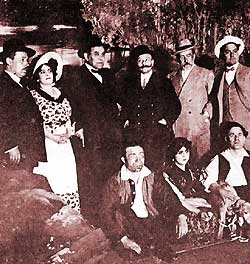ARIA RECORDING

Original cast photo, Nieto (with lamb) as Maruxa.
The composer
is standing, third from left.
Maruxa
complete set
of Amadeo Vives's 1914 zarzuela
(Barcelona 1930, plus extracts
1914/15)
Aria Les nostres veus retrobades
24
[Aria SL 1031]
Vives's 2-act "pastoral eclogue" has
been surprisingly lucky on record. The story, a light comedy in which a pair of
lovely but decidedly simple-minded rustics are sexually harassed by a pair of
rich, young 'townies' who ought to know better, teeters on the brink of
tweeness, especially when it comes to Linda the Lamb, the heroine's four-legged
friend. Still, the librettist came up with one really memorable character in
Estate overseer Rufo, a comic bass who seems to have wandered in out of
Smetana, and Vives's music is as consistent and memorable as anything in
Doña Francisquita.
There are three modernish recordings
from the 1950's to 70's to choose from, but Aria
Recording have come up with a fascinating early alternative. In
unearthing the 1930 complete set under Antoni Capdevila they have
provided anyone interested in Spanish opera with a tempting rarity, especially
given the substantial bonus - 50 minutes of largely original cast recordings
from 1914 and 15, giving us glimpses of the original Rosa and Antonio, as well
as virile but subtle singing from the young Inocencio Navarro as Pablo.
The creator of Maruxa, Ofelia Nieto, sings the title role in both sets.
A startlingly mature-sounding 14 at the time of the premiere, she was still
only 30 at the time of the Barcelona sessions, which were almost her swansong.
Later that year she retired from the stage, and a year later she was dead. The
voice, an opulent lyric soprano, had become richer and fuller by 1930 - Joan
Vilà's customarily comprehensive notes tell us it was difficult for
recording to do it justice - but Nieto's even projection and musicality shine
through. Unlike her vocal quality, the characterisation is pallid, but this
blandness may well be inherent in the role.
Her sister
Ángeles Ottein (Nieto backwards with an additional "t") was a
lighter lyric soprano, though she was equally far from being a warbling
nightingale. Spoilt, pert Rosa offers the better opportunities to the singer in
some ways. Neither soprano has a full-dress solo romanza, but Rosa's
dúos with Rufo and Pablo are meatier than Maruxa's with Pablo and
Antonio. Ottein makes the most of Rosa's 'hots' for the shepherd Pablo -
there's a voracious sexual hunger in her singing which no later performer on
record quite matches.
The shepherd himself is intriguingly guested by
an Italian. Carlo Galeffi already had over 30 years' experience in
theatres such as La Scala Milan behind him when he recorded Maruxa, and he was
to carry on singing into his seventies. He played Pablo on stage in Madrid,
where he also created Puck in the inflated, operatic version of Las
golondrinas in 1929. As you'd expect from one of the most esteemed
Rigolettos of the period, Galeffi's immaculate technique easily lightens his
powerful, lyric baritone for Vives's softer demands. At this stage of his
career, there was the occasional suggestion of a bleat in the middle register,
but the top of Galeffi's voice was still wondrously easy, dynamics are
miraculously shaded, and his characteristic quick vibrato is used to touching
musical effect in Pablo's final romanza without becoming intrusive.
Bass Aníbal Vela was never well-known outside Spain, but
turns in the best sung Rufo on record, massive, heavy yet mellifluous.
Capdevila's tempi, perhaps surprisingly for the era of short sides, are
broad and flexible without ruining dramatic momentum. The Act 2 Preludio
sounds solid if inevitably constricted, but the Thunderstorm goes
notably well, and some surprising detail elsewhere - especially some prominent
writing for glockenspiel - emerges more clearly here than on the later sets.
Although only twenty years or so were to pass before Argenta recorded
Maruxa with Rosado, Lorengar and Ausensi, the vocal
values on the earlier recording sound a world away. This 1930's Barcelona set
is one of the most instructive documents of zarzuela on record, and Joan
Vilà's excellent transfers do it full justice. More than that, it
remains a rich musical experience in its own right, and for my money is
Aria's best release yet.
© Christopher Webber 2000
Aria
Recording
other issues
in the series of particular interest to the zarzuela:
SL
1008 Los nostres veus retrobades - Vol.1 (zarzuela and opera anthology)
SL 1011 Doña Francisquita (Vendrell, Pérez Carpio,
Herrero, Palacios)
SL 1007 Marina (2 CD complete - Capsir,
Lázaro, Redondo, Mardones; plus highlights with Fleta, Revenga, Sagi
Barba)
SL 1016 Mercedes Capsir (including some rare zarzuela
songs)
SL 1015 Bohemios / Los Gavilanes (Redondo, Raga,
Vendrell)
SL 1018 Marcos Redondo (zarzuela duets)
SL
1022 Los nostres veus retrobades - Vol.2 (opera, zarzuela and songs)
SL 1024 La Sarsuela Catalana
SL 1027 El Dictador - La
Dogaresa
SL 1028 Miguel Fleta - Vol.3 (zarzuela and songs)
SL 1029 Martierra etc.
SL 1030 Conchita Supervia - (2 CD
complete Opera and selected zarzuela recordings)
Aria's website:
http://www.ariarecording.com
Maruxa - synopsis
1930 Barcelona Recording (Aria Recording)
Amadeo Vives -
biography
CD Review index